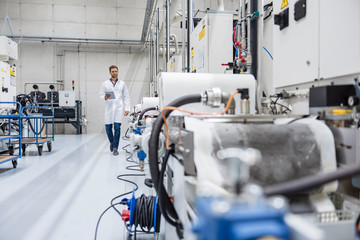The manufacturing industry has long been a cornerstone of global economic development, driving innovation, job creation, and industrial growth. However, as industries evolve, so do the tools and technologies that fuel them. One of the most transformative technologies to emerge in recent years is Generative AI (Gen AI). This sophisticated form of artificial intelligence is not only enhancing the efficiency of manufacturing processes but also revolutionizing the way products are designed, produced, and delivered. In this article, we will explore the profound impact of Gen AI in the manufacturing industry, examining its applications, benefits, challenges, and future potential.
Understanding Generative AI
Generative AI is a subset of artificial intelligence that involves algorithms capable of creating new content, designs, or solutions based on input data. Unlike traditional AI, which primarily analyzes and processes existing data, Gen AI can generate new models, designs, or strategies that did not exist before. This capability is particularly valuable in manufacturing, where innovation and efficiency are key drivers of success.
Gen AI leverages machine learning models, such as Generative Adversarial Networks (GANs) and Variational Autoencoders (VAEs), to create new data points from existing datasets. These models learn patterns and structures from the data they are trained on and use this knowledge to generate new, similar content. In the context of manufacturing, this means creating new product designs, optimizing production processes, and even predicting potential issues before they arise.
Applications of Gen AI in Manufacturing
The integration of Gen AI into manufacturing is unlocking new possibilities across various domains:
1. Product Design and Innovation
One of the most significant applications of Gen AI in manufacturing is in product design. Traditionally, product design has been a time-consuming process that relies heavily on human creativity and expertise. However, with Gen AI, manufacturers can now automate and accelerate this process. By analyzing existing designs and consumer preferences, Gen AI can generate new, innovative designs that meet specific criteria, such as cost-efficiency, durability, and aesthetic appeal.
For instance, automotive manufacturers are using Gen AI to design lighter and more fuel-efficient vehicles. The AI analyzes thousands of design options and generates prototypes that optimize performance while reducing material usage. This not only speeds up the design process but also leads to products that are more aligned with market demands.
2. Process Optimization
In addition to product design, Gen AI is also being used to optimize manufacturing processes. By analyzing production data, AI algorithms can identify inefficiencies and suggest improvements. This can lead to significant cost savings, reduced waste, and increased productivity.
For example, in assembly lines, Gen AI can predict potential bottlenecks and suggest adjustments to maintain smooth operations. It can also optimize supply chain management by forecasting demand and adjusting inventory levels accordingly. These improvements not only enhance efficiency but also contribute to sustainability by minimizing resource consumption.
3. Predictive Maintenance
Maintenance is a critical aspect of manufacturing that directly impacts productivity and profitability. Traditional maintenance approaches are often reactive, addressing issues only after they occur. However, Gen AI enables a shift toward predictive maintenance, where potential equipment failures are identified before they happen.
By analyzing data from sensors embedded in machinery, Gen AI can detect early signs of wear and tear, predict when maintenance is needed, and even suggest the most effective maintenance strategies. This proactive approach reduces downtime, extends the lifespan of equipment, and lowers maintenance costs.
4. Supply Chain Management
The supply chain is a complex network that requires careful coordination to ensure timely delivery of materials and products. Gen AI is revolutionizing supply chain management by providing manufacturers with real-time insights and predictive analytics.
AI-driven supply chain models can predict disruptions, optimize logistics, and suggest alternative routes or suppliers to mitigate risks. This level of insight allows manufacturers to maintain a resilient supply chain, ensuring continuity even in the face of unexpected challenges.
Benefits of Generative AI in Manufacturing
The adoption of Gen AI in the manufacturing industry offers numerous benefits:
1. Increased Efficiency
Gen AI streamlines various aspects of manufacturing, from design to production, leading to increased efficiency. Automated design processes, optimized production lines, and predictive maintenance all contribute to faster and more cost-effective manufacturing.
2. Enhanced Innovation
By leveraging Gen AI, manufacturers can push the boundaries of innovation. AI-generated designs often explore possibilities that humans might not consider, leading to unique and cutting-edge products. This capability enables manufacturers to stay ahead of the competition and meet evolving consumer demands.
3. Cost Reduction
The efficiency gains and predictive capabilities of Gen AI translate into significant cost savings. Reduced material waste, lower maintenance costs, and optimized supply chains all contribute to a leaner and more profitable manufacturing process.
4. Improved Product Quality
Gen AI’s ability to analyze vast amounts of data and generate optimized designs leads to higher-quality products. AI-driven designs are often more precise, durable, and tailored to consumer preferences, resulting in greater customer satisfaction.
Challenges of Implementing Gen AI in Manufacturing
While the potential of Gen AI in manufacturing is immense, there are several challenges that need to be addressed:
1. Data Quality and Availability
Gen AI relies heavily on high-quality data to generate accurate and useful outputs. In many cases, manufacturing data may be incomplete, inconsistent, or siloed across different systems. Ensuring that data is clean, comprehensive, and accessible is a critical step in implementing Gen AI effectively.
2. Integration with Existing Systems
Manufacturers often operate complex and legacy systems that may not be easily compatible with Gen AI technologies. Integrating AI into these systems requires careful planning and may involve significant investments in infrastructure and software.
3. Skill Gaps
The successful deployment of Gen AI requires a workforce skilled in AI and data science. However, there is a shortage of professionals with expertise in these areas. Manufacturers must invest in training and development to build the necessary skills within their teams.
4. Ethical Considerations
As with any AI technology, there are ethical considerations to address. The use of Gen AI in manufacturing raises questions about job displacement, data privacy, and the potential for AI-generated designs to infringe on intellectual property rights. Manufacturers must navigate these issues carefully to ensure responsible and sustainable AI adoption.
The Future of Gen AI in Manufacturing
The future of Gen AI in the manufacturing industry is promising, with the potential to reshape the sector in profound ways:
1. Mass Customization
Gen AI will enable manufacturers to offer mass customization at scale. Consumers will be able to order products tailored to their specific preferences, with AI generating designs that meet individual needs. This will revolutionize industries such as fashion, automotive, and consumer electronics.
2. Sustainable Manufacturing
As sustainability becomes a top priority, Gen AI will play a key role in minimizing the environmental impact of manufacturing. AI-driven designs will prioritize resource efficiency, and optimized processes will reduce waste and energy consumption. This will contribute to a more sustainable and environmentally responsible industry.
3. Collaborative Human-AI Design
The future of product design will likely involve a collaborative approach where humans and AI work together. Designers will leverage AI-generated ideas to enhance their creativity and innovation, leading to products that combine the best of both worlds—human intuition and AI precision.
4. AI-Driven Manufacturing Ecosystems
As AI technologies continue to advance, we can expect the emergence of AI-driven manufacturing ecosystems. These ecosystems will involve interconnected AI systems that communicate and collaborate across the entire manufacturing process, from design to delivery. This level of integration will further enhance efficiency, innovation, and responsiveness to market changes.
Conclusion
Generative AI is poised to revolutionize the manufacturing industry by driving innovation, efficiency, and sustainability. While challenges remain, the potential benefits of Gen AI are too significant to ignore. As manufacturers continue to explore and adopt this technology, we can expect to see a new era of production that is more agile, creative, and responsive to the needs of consumers and the environment.
FAQs About Gen AI in Manufacturing
1. What is Generative AI?
Generative AI is a type of artificial intelligence that can create new content, designs, or solutions based on existing data. In manufacturing, it is used to generate innovative product designs, optimize processes, and predict potential issues.
2. How is Gen AI different from traditional AI?
Traditional AI primarily analyzes and processes existing data, while Gen AI can generate new data points and solutions that did not exist before. This makes Gen AI particularly valuable in creative and innovative applications.
3. What are the benefits of using Gen AI in manufacturing?
The benefits of Gen AI in manufacturing include increased efficiency, enhanced innovation, cost reduction, and improved product quality. It enables manufacturers to streamline processes, reduce waste, and create high-quality products that meet consumer demands.
4. What challenges do manufacturers face when implementing Gen AI?
Challenges include data quality and availability, integration with existing systems, skill gaps in the workforce, and ethical considerations such as job displacement and data privacy.
5. What is the future of Gen AI in manufacturing?
The future of Gen AI in manufacturing includes mass customization, sustainable manufacturing, collaborative human-AI design, and the development of AI-driven manufacturing ecosystems. These advancements will further transform the industry, driving innovation and efficiency.













